Cuba on Tuesday once again arrested José Daniel Ferrer, leader of the largest dissident organization in the country, the Patriotic Union of Cuba (UNPACU), three months after his release.
Ferrer’s sister, Ana Belkis Ferrer Garcia, first denounced the arrest of her brother using the activist’s social media accounts, adding that Castro regime officials assaulted Ferrer’s house in Santiago de Cuba, which doubles as UNPACU’s headquarters. The regime thugs reportedly ransacked it and took away Ferrer, his wife Nelva Ismarays Ortega Tamayo, their infant child Daniel José, and other activists.
Hours later, Ferrer Garcia disclosed that both Ortega Tamayo and the child Daniel Jose were released after spending hours detained at a torture center in Versalles, stressing that the whereabouts of Ferrer and the activists remained unknown. Ferrer’s brother Luis Enrique Ferrer spoke to Martí Noticias and described the violent assault on UNPACU’s headquarters and the arrest of his brother, asserting, “the dictatorship stormed the house as if they were capturing an international terrorist.”
Gabriel Ferrer, one of the activist’s sons, published a video on Tuesday denouncing that Castro regime officials had seized food that Ferrer distributed to Cubans, as well as several objects ranging from a refrigerator, cooking gas bottles, and telephones. Ortega Tamayo, Ferrer’s wife, explained in the video that Castro regime officials stormed the headquarters on Tuesday morning and violently took the activist away.
José Daniel Ferrer is a prominent Cuban human rights activist and anti-communist freedom advocate who has been unjustly detained by the Castro regime several times since the events of 2003‘s “Black Spring” dissident crackdown. Throughout his past imprisonment, Ferrer has been subject to degrading and inhumane treatment by Castro regime officials, such as being fed rotten food and “semi-fecal” water.
Ferrer was once again imprisoned on July 2021 for participating in one of the nationwide peaceful anti-communist protests that erupted in Cuba at the time, and he remained in prison until January 2025. He was released alongside 550 other political prisoners as per the terms of an agreement between Cuba and the administration of former U.S. President Joe Biden, with the Vatican serving as mediators.
In return, former President Biden removed Cuba from the United States’ list of state sponsors of terrorism (SST), a designation Cuba has consistently maintained since 1982 outside of a six-year period between 2015 and 2021 courtesy of former President Barack Obama.
The United States designated Cuba a state sponsor of terrorism due to the Castro regime’s extensive track record of supporting international terrorist organizations such as Colombia’s FARC and ELN Marxist terror groups, the jihadist group Hamas, and Iran’s proxy Hezbollah. President Donald Trump revoked Biden’s decision and reinstated Cuba to the SST list within the first hours of his new term, drawing the ire of Castro regime officials who accused President Trump of being “drunk with arrogance.”
The Castro regime did not release the 550 political prisoners immediately after signing the original Biden-era agreement and instead elongated the process through mid-March. None of the released individuals were given a full release and instead were “ex-incarcerated,” a euphemism used by the Cuban communists that tacitly imposes restrictions that bar the “ex-incarcerated” men and women from living a normal life.
“Ex-incarcerated” individuals are constantly threatened and harassed by Cuban state officials and are denied the ability to freely work and study. The “ex-incarceration benefit” can be arbitrarily revoked by the Cuban state officials at any given moment and without need of a valid justification.
Maricela Sosa, vice president of Cuba’s Supreme Popular Tribunal, reportedly justified the revocation of Ferrer’s “ex-incarceration” on the grounds that the activist failed to attend two mandatory court hearings following his release in violation of Cuban law.
“Not only did he not show up, but he also announced through his social media profile, in flagrant defiance and non-compliance with the law, that he would not appear before the judicial authority,” Sosa told Reuters on Tuesday.
Following his release in January, Ferrer began operating a soup kitchen in his residence in Santiago de Cuba. Ferrer denounced at the time that Cuban state officials cordoned off the area and threatened those who arrived with arrest or removal of government benefits, making it impossible for Ferrer to feed Cuba’s impoverished and starving population.
“The only solution to hunger here and throughout Cuba is to bring in democracy,” Ferrer reportedly said at the time.
In addition to Ferrer, the Cuban regime arrested Matanzas activist Félix Navarro for allegedly violating the terms of his “ex-incarceration” by leaving the municipality in which he lives without first seeking authorization from a judge. The outlet Cubanet reported that Navarro was arrested while he visited his wife and member of the Ladies in White dissident group Sonia Alvarez at the Matanzas prison, where their daughter Sayli Navarro is also imprisoned.
Christian K. Caruzo is a Venezuelan writer and documents life under socialism. You can follow him on Twitter here.
Read the full article here



